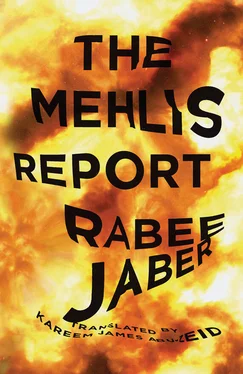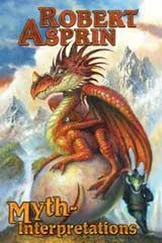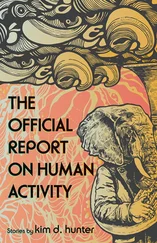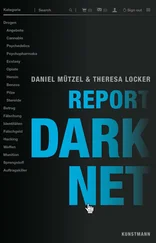The strange thing was that there was no fear in me. The city seemed dead; I was alone in the night beneath that strange white moon; those dark eyes were following me; my blouse was gone; my head was covered in dried blood. But I felt no fear within me. How could that be? I didn’t think about my father, or my mother, or my siblings. I was standing by the half-ruined steps beneath the Fuad Shihab Bridge and looking at the mosquitoes on the swamp’s surface, and I felt no fear. The moon gleamed on the mud — mud as still as ice. The light shone on its glassy surface. I wasn’t thinking of my boyfriend or my last vacation in Brussels or the green blouse I’d lost. The dome of the Opera Cinema appeared, half-black, in the distance. What happened to it? I wondered. Had it been burned by the shelling? Why wasn’t it green anymore? But nothing really disturbed me except my thirst. My thirst and my confusion. I was confused because I didn’t know where the fighters were, where the people of the city were. Had the shelling grown worse while I was kidnapped? Had the people moved even farther away from the demarcation line? Had the areas near the line been burned and destroyed? Where did the desolation end? How many hours would I have to walk before I found people? And how could I proceed if those yellow eyes kept blocking the way? Was I afraid of them?
I realized I wasn’t afraid of them. It wasn’t fear that was standing in my way. It was the memory of fear. There was no fear anymore. I wasn’t afraid. I pulled the blanket around my shoulders, turned around, and started walking toward the east, toward the Monot district. The yellow eyes seemed to be receding. They seemed to recede as I advanced. Was that real, or was I just imagining it?
I walked toward East Beirut, but did not reach it. How was that possible? I walked and walked, but I was still by the stairs beneath the bridge. How?
Before I understood what was happening, I saw a ghost, a shadow behind some pillars. The shadow emerged and drew nearer. It wasn’t a ghost. I knew that man. I’d seen him before, but where? I couldn’t remember. Maybe at the university. Maybe in school. Maybe at the movies. Maybe somewhere in town. I couldn’t remember where I’d seen his face, but it was familiar. I wasn’t afraid of him. And I thought he might be able to help me go back home. The house wasn’t far from here. I just had to go up into Monot and turn left on Saint Joseph University Street, then turn right, then left again, and I would be on Ghandour al-Saad Street. It would only take a few minutes. But I was stuck beneath this bridge, between East and West Beirut — as if I were tethered to the ground.
As he approached, I noticed the man looked old. He wasn’t old, but he seemed ancient. He looked a bit like my father. A distant resemblance, but there all the same. I told him I’d been kidnapped and they’d left me by the museum with this blanket. I told him I’d walked here from the museum, and my house was nearby.
He asked, what’s your name?
Josephine, I said, my name’s Josephine Yarid.
Look at my face, he replied, don’t you recognize me?
I said I’d seen him before, had seen him several times, but couldn’t remember where.
Look at my face, he said, and imagine me with white hair — not black like this, but white.
I said I was tired, I said I was thirsty — so tired and thirsty I couldn’t think straight, and couldn’t imagine him with white hair. But I’ve seen you before, I said, and I know you.
I wanted him to help me. To pick me up and carry me home. I wanted him to pick me up and carry me in his arms like a child — I wanted him to take me to my family. Why doesn’t he carry me home? I wanted to open my eyes and see myself back on the familiar sofa in my own familiar house again. To open my eyes and see the faces I knew looking back at me. I wanted them to look at me and tell me I’d come back, tell me I’d been saved. Why wasn’t he taking me home right then and there?
I stared at him and noticed that he looked like my brother — he didn’t just look like my father, he looked like Saman as well. But he wasn’t Saman. This man was older than my brother. I’ll try to picture him with white hair, I thought. And then he spoke again.
“Josephine, I’m your grandfather.”
At that moment, I knew I was dead.
“Am I dead, grandfather?”
“That’s right, Josephine.”
“I’m dead?”
“This is the land of the dead.”
That’s right. I remembered his voice. That was my grandfather’s voice. And that was his face. But the hair had thrown me off: I was used to seeing him with white hair; he looked so different with black hair.
He picked me up, and I collapsed into his arms. My body was weak. Sleep was weighing on my eyelids. He said I was tired from all the walking, and because I had woken up early. He said I should get some sleep. He said there was still blood in my body, I hadn’t slept enough. Sleep, Josephine, he said, sleep now, and don’t think about things. He said the blood was still thick in my body — that’s why I’d kept walking and walking, and why I felt so tired.
“Sleep now.”
His voice was soothing, but I was too worked up to sleep. What was bothering me so much? The dried blood in my hair? The dirt on my skin? What was keeping me from falling asleep in his arms? This was my grandfather. Yes. Even if he had dyed his hair black. This was my grandfather. I knew him. What was bothering me, then? I opened my eyes and saw the place was growing darker. The moon was gone, but a handful of stars had appeared in the sky. Stars and clouds and fog. The fog was seething like milk on the fire: I saw it rise and swallow the stars one after the other. We were moving. My grandfather was carrying me in his arms. Where was he taking me? I felt us going up some steps, then going down some steps. Where was he taking me? I saw what looked like two candles approaching. Someone was emerging from the dense night, someone quite short. Then I realized those weren’t candles. I was looking at the eyes of an animal. An invisible animal? No, there it was — a black animal. As black as this darkness.
“This is the land of the dead.”
The animal drew closer. It was a rat, a giant rat. I squirmed like a fish on dry land. I writhed in the arms of my grandfather, who was still moving forward, unafraid of the terrifying rat.
“Don’t be afraid, Josephine.”
I wanted to say something, but horror seized my throat.
I looked into my grandfather’s eyes and pleaded with him: “No, grandfather, no.” He looked at me. No sound had left my throat, but he looked me in the eyes and heard what I was saying. I was speaking within my heart. And my grandfather — because he was grandfather — heard me.
He stopped moving forward, and the huge rat froze in its place as well. My grandfather said things I did not understand. Don’t be afraid of the rat, he said, you needn’t feel scared. There’s a lot of life left in your body. You’re dead now, but there’s still life in your body. You won’t rest with all that life left inside you. This rat is here for our sake, Josephine. Don’t be afraid.
“No,” I said.
The rat retreated, but it wasn’t long before it appeared again. It approached and opened its jaws. I saw its teeth, white tinged with yellow. Ivory white. My grandfather said I should sleep: Why don’t you sleep?
“No,” I said. “Grandfather, no.”
There was still some spirit in me. I had bled out my blood — there was none left in my body — so where had this spirit come from?
“All right,” my grandfather said, and led me away from the rat. I followed him toward some lit-up houses.
Читать дальше












